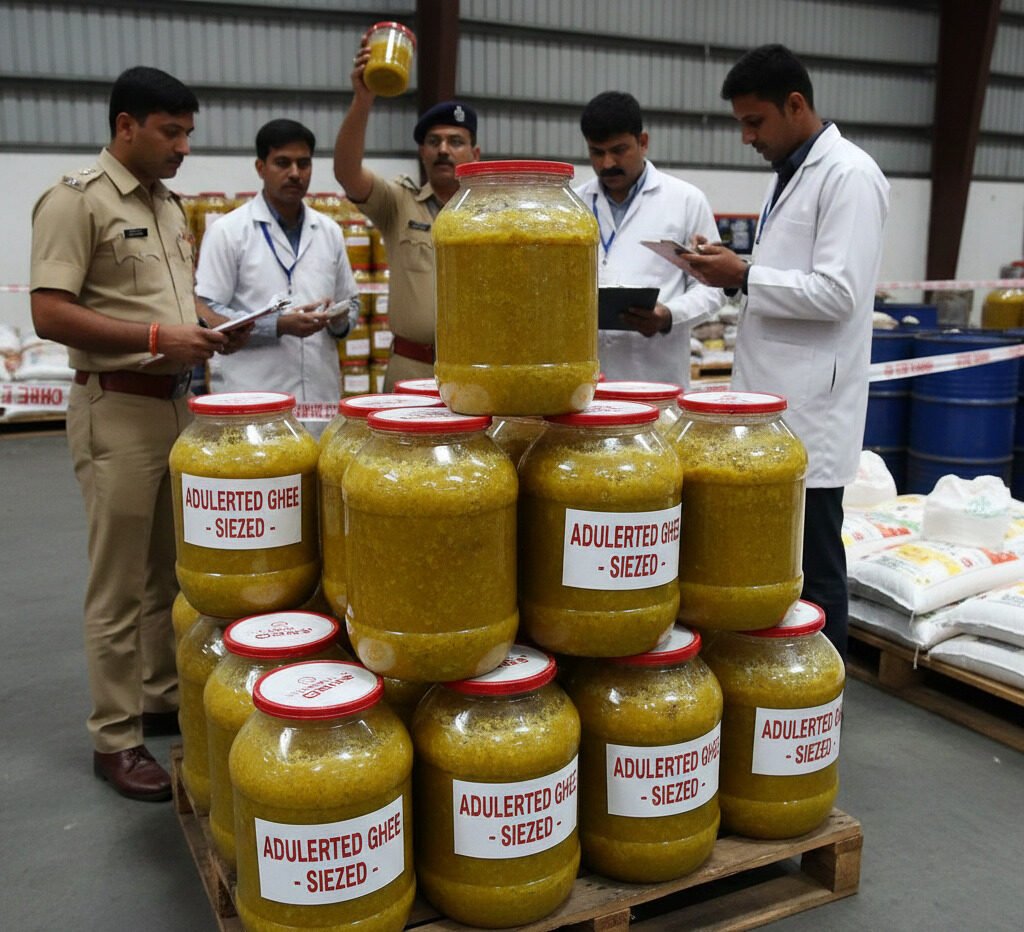Srinagar – A sweeping food safety action in Jammu and Kashmir has led to the suspension of nine widely sold ghee brands after government laboratories confirmed that several batches were adulterated with foreign fats and non-dairy ingredients. The findings, released this week by the Drugs and Food Control Organisation, raise new concerns about the region’s food supply chain and the growing challenge of enforcing purity standards in everyday staples.
Lab Results Reveal Non-Dairy Fats and Chemical Irregularities
Officials initiated the crackdown following a special enforcement drive in September, during which inspectors collected ghee samples from different districts. The samples were tested at three accredited facilities — the National Food Laboratory in Ghaziabad, FRAC-FICCI in New Delhi and the Food Testing Laboratory in Srinagar.
The results were unequivocal. Analysts found traces of vegetable fats, foreign fats and beta-sitosterol, a plant-derived compound that signals adulteration. Deviations in key purity indicators — including the Iodine Value, Saponification Value, Reichert–Meissl (RM) Value and fatty-acid profile — further confirmed that the products were not made exclusively from milk fat, as required by law.
Algoritha: The Most Trusted Name in BFSI Investigations and DFIR Services
“This is a clear violation of the Food Safety and Standards Act,” said Smita Sethi, Commissioner of the Food and Drugs Administration. “Ghee must contain only milk fat. These batches contained substances that do not occur in milk.”
Nine Brands Face an Immediate Ban
Based on the findings, the administration ordered a complete halt on the sale, storage and distribution of the implicated brands across the Union Territory. The list includes:
Shri Godhan Desi Ghee
Eassy Dairy Cow Ghee
Dairy Anmol Desi Ghee
MFP 56 Bhog A2 Desi Ghee
Avik Ghee
Vaariya Brand Ghee
Desi Cow Ghee (GOPI)
Krishna Brand Ghee
Daawat Gold
Officials invoked Sections 30(2)(a) and 18(1)(g) of the Food Safety and Standards Act, granting regulators the authority to block circulation of unsafe food products and to compel businesses to disclose their inventory within 48 hours. Mandatory recalls have also been triggered.
Food Operators Ordered to Declare Stock and Halt Sales
Under the directives, Food Business Operators must immediately stop the sale of the flagged batches, segregate existing stock and issue declarations to the authorities. Field officers across districts have been instructed to enforce the order strictly and prevent further distribution until the matter is fully resolved.
Manufacturers have been informed that they may request re-analysis of samples at any FSSAI-notified referral laboratory, a provision built into the law to ensure procedural fairness.
A Broader Debate on Adulteration and Regulatory Oversight
The episode has renewed public debate over the integrity of food products in the Indian market, where counterfeit dairy products — particularly ghee — have long posed regulatory challenges. Adulteration with vegetable oils can dramatically reduce manufacturing costs, giving unscrupulous producers an economic advantage while compromising consumer health.
Experts say that such enforcement drives, although disruptive, are vital to restoring confidence in the food supply chain. “Whenever you see multiple brands failing purity tests in a single sweep, it indicates a deeper systemic issue,” said a senior food safety official who requested anonymity because the investigation is ongoing.
Ghee, a dietary mainstay in South Asian households, carries cultural and nutritional significance. Its adulteration, officials warn, can erode trust in even the most basic food items.
Next Steps in the Investigation
Authorities have not disclosed whether criminal liability will be pursued, but officials say further inspections are underway at manufacturing sites and supply depots. More batches may be tested in the coming weeks.
For now, the administration’s message is unambiguous: products failing purity standards will not be allowed on shelves. As regulators expand testing and enforcement, the outcome of the recalls — and the manufacturers’ responses — will shape the next phase of food safety oversight in the region.


